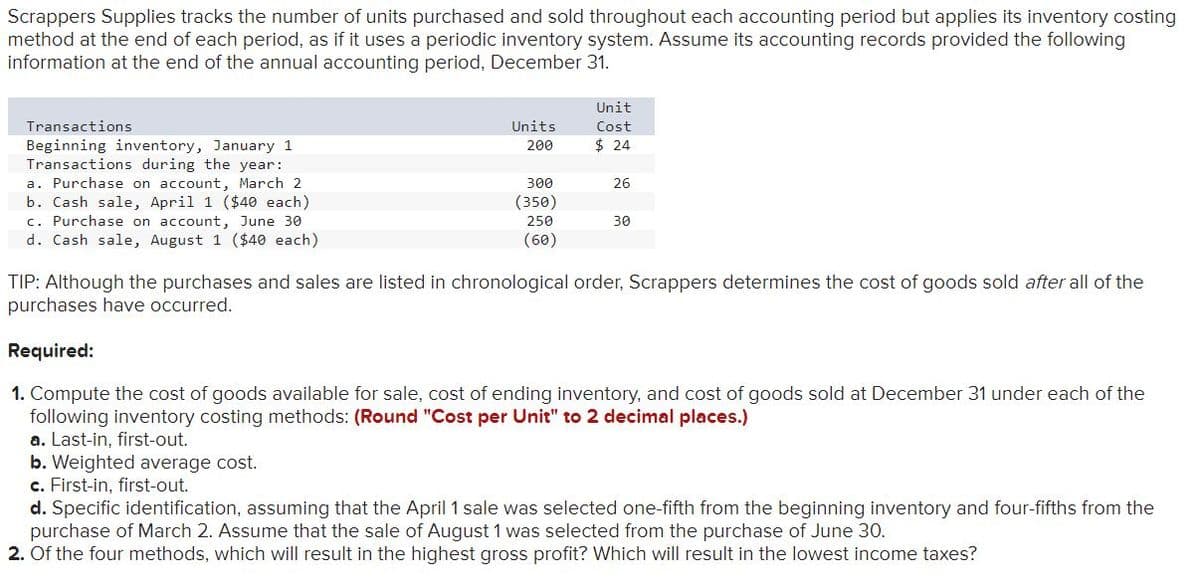Scrappers Supplies tracks the number of units purchased and sold throughout each accounting period but applies its inventory costing method at the end of each period, as if it uses a periodic inventory system. Assume its accounting records provided the following information at the end of the annual accounting period, December 31. Unit Transactions Units Cost $ 24 Beginning inventory, January 1 Transactions during the year: a. Purchase on account, March 2 b. Cash sale, April 1 ($4e each) c. Purchase on account, June 30 d. Cash sale, August 1 ($40 each) 200 300 26 (350) 250 30 (60) TIP: Although the purchases and sales are listed in chronological order, Scrappers determines the cost of goods sold after all of the purchases have occurred. Required: 1. Compute the cost of goods available for sale, cost of ending inventory, and cost of goods sold at December 31 under each of the following inventory costing methods: (Round "Cost per Unit" to 2 decimal places.) a. Last-in, first-out. b. Weighted average cost. c. First-in, first-out. d. Specific identification, assuming that the April 1 sale was selected one-fifth from the beginning inventory and four-fifths from the purchase of March 2. Assume that the sale of August 1 was selected from the purchase of June 30. 2. Of the four methods, which will result in the highest gross profit? Which will result in the lowest income taxes?
Scrappers Supplies tracks the number of units purchased and sold throughout each accounting period but applies its inventory costing method at the end of each period, as if it uses a periodic inventory system. Assume its accounting records provided the following information at the end of the annual accounting period, December 31. Unit Transactions Units Cost $ 24 Beginning inventory, January 1 Transactions during the year: a. Purchase on account, March 2 b. Cash sale, April 1 ($4e each) c. Purchase on account, June 30 d. Cash sale, August 1 ($40 each) 200 300 26 (350) 250 30 (60) TIP: Although the purchases and sales are listed in chronological order, Scrappers determines the cost of goods sold after all of the purchases have occurred. Required: 1. Compute the cost of goods available for sale, cost of ending inventory, and cost of goods sold at December 31 under each of the following inventory costing methods: (Round "Cost per Unit" to 2 decimal places.) a. Last-in, first-out. b. Weighted average cost. c. First-in, first-out. d. Specific identification, assuming that the April 1 sale was selected one-fifth from the beginning inventory and four-fifths from the purchase of March 2. Assume that the sale of August 1 was selected from the purchase of June 30. 2. Of the four methods, which will result in the highest gross profit? Which will result in the lowest income taxes?
Financial And Managerial Accounting
15th Edition
ISBN:9781337902663
Author:WARREN, Carl S.
Publisher:WARREN, Carl S.
Chapter6: Inventories
Section: Chapter Questions
Problem 1PB: FIFO perpetual inventory The beginning inventory at Dunne Co. and data on purchases and sales for a...
Related questions
Question

Transcribed Image Text:Scrappers Supplies tracks the number of units purchased and sold throughout each accounting period but applies its inventory costing
method at the end of each period, as if it uses a periodic inventory system. Assume its accounting records provided the following
information at the end of the annual accounting period, December 31.
Unit
Transactions
Units
Cost
$ 24
Beginning inventory, January 1
Transactions during the year:
a. Purchase on account, March 2
b. Cash sale, April 1 ($40 each)
c. Purchase on account, June 30
d. Cash sale, August 1 ($40 each)
200
300
26
(350)
250
30
(60)
TIP: Although the purchases and sales are listed in chronological order, Scrappers determines the cost of goods sold after all of the
purchases have occurred.
Required:
1. Compute the cost of goods available for sale, cost of ending inventory, and cost of goods sold at December 31 under each of the
following inventory costing methods: (Round "Cost per Unit" to 2 decimal places.)
a. Last-in, first-out.
b. Weighted average cost.
c. First-in, first-out.
d. Specific identification, assuming that the April 1 sale was selected one-fifth from the beginning inventory and four-fifths from the
purchase of March 2. Assume that the sale of August 1 was selected from the purchase of June 30.
2. Of the four methods, which will result in the highest gross profit? Which will result in the lowest income taxes?
Expert Solution
This question has been solved!
Explore an expertly crafted, step-by-step solution for a thorough understanding of key concepts.
This is a popular solution!
Trending now
This is a popular solution!
Step by step
Solved in 2 steps

Recommended textbooks for you

Financial And Managerial Accounting
Accounting
ISBN:
9781337902663
Author:
WARREN, Carl S.
Publisher:
Cengage Learning,

College Accounting, Chapters 1-27
Accounting
ISBN:
9781337794756
Author:
HEINTZ, James A.
Publisher:
Cengage Learning,

Financial Accounting
Accounting
ISBN:
9781337272124
Author:
Carl Warren, James M. Reeve, Jonathan Duchac
Publisher:
Cengage Learning

Financial And Managerial Accounting
Accounting
ISBN:
9781337902663
Author:
WARREN, Carl S.
Publisher:
Cengage Learning,

College Accounting, Chapters 1-27
Accounting
ISBN:
9781337794756
Author:
HEINTZ, James A.
Publisher:
Cengage Learning,

Financial Accounting
Accounting
ISBN:
9781337272124
Author:
Carl Warren, James M. Reeve, Jonathan Duchac
Publisher:
Cengage Learning

Intermediate Accounting: Reporting And Analysis
Accounting
ISBN:
9781337788281
Author:
James M. Wahlen, Jefferson P. Jones, Donald Pagach
Publisher:
Cengage Learning


Principles of Accounting Volume 1
Accounting
ISBN:
9781947172685
Author:
OpenStax
Publisher:
OpenStax College